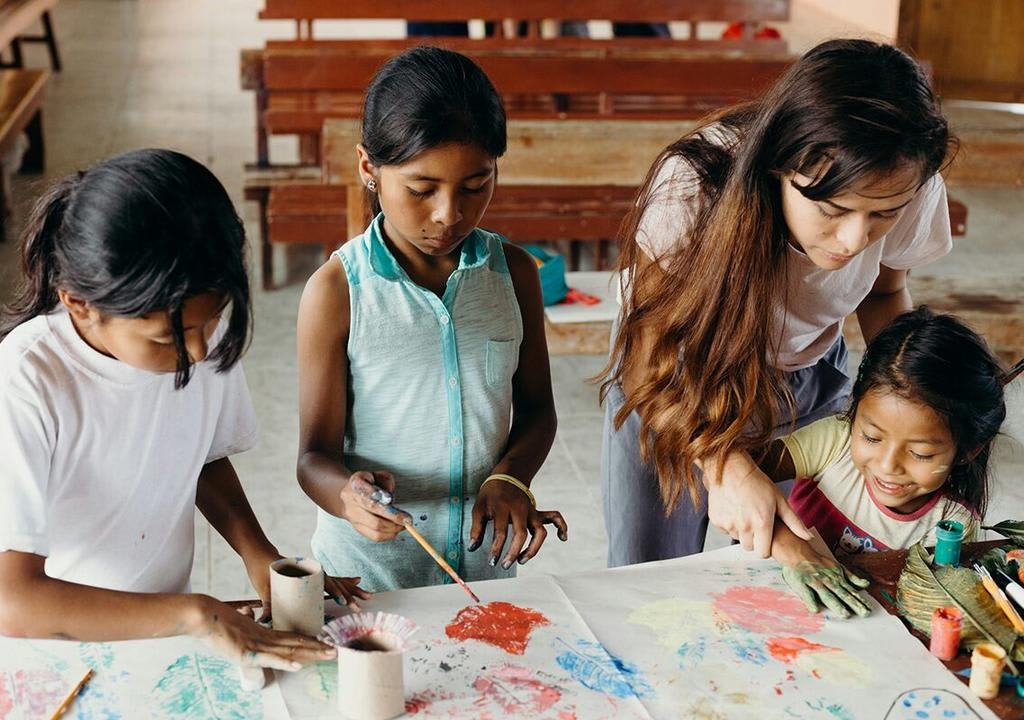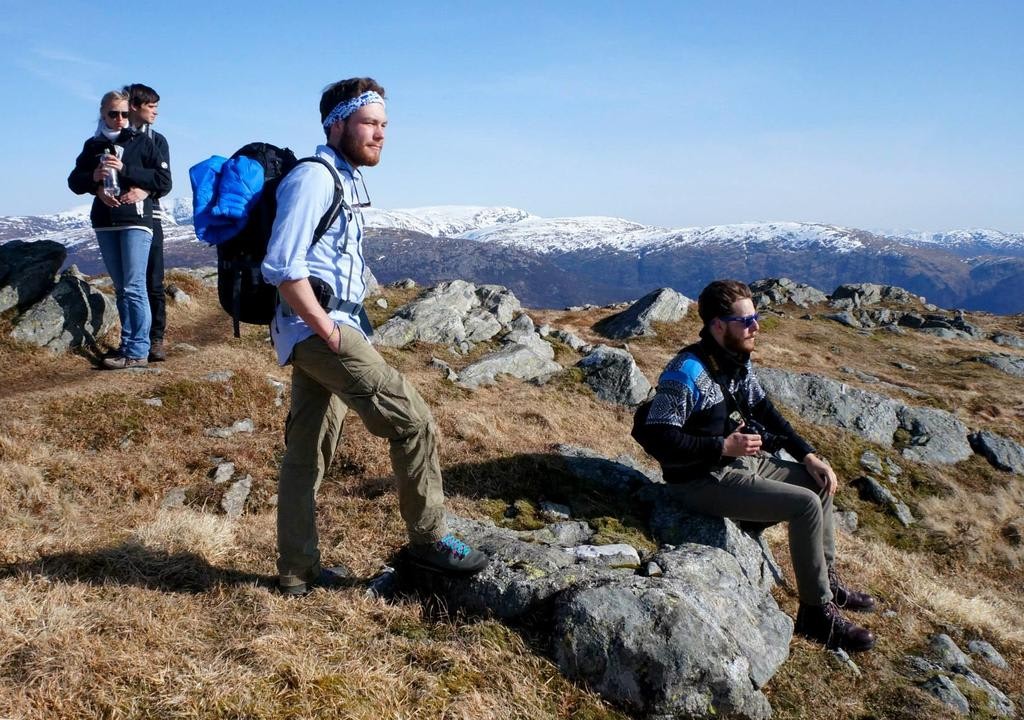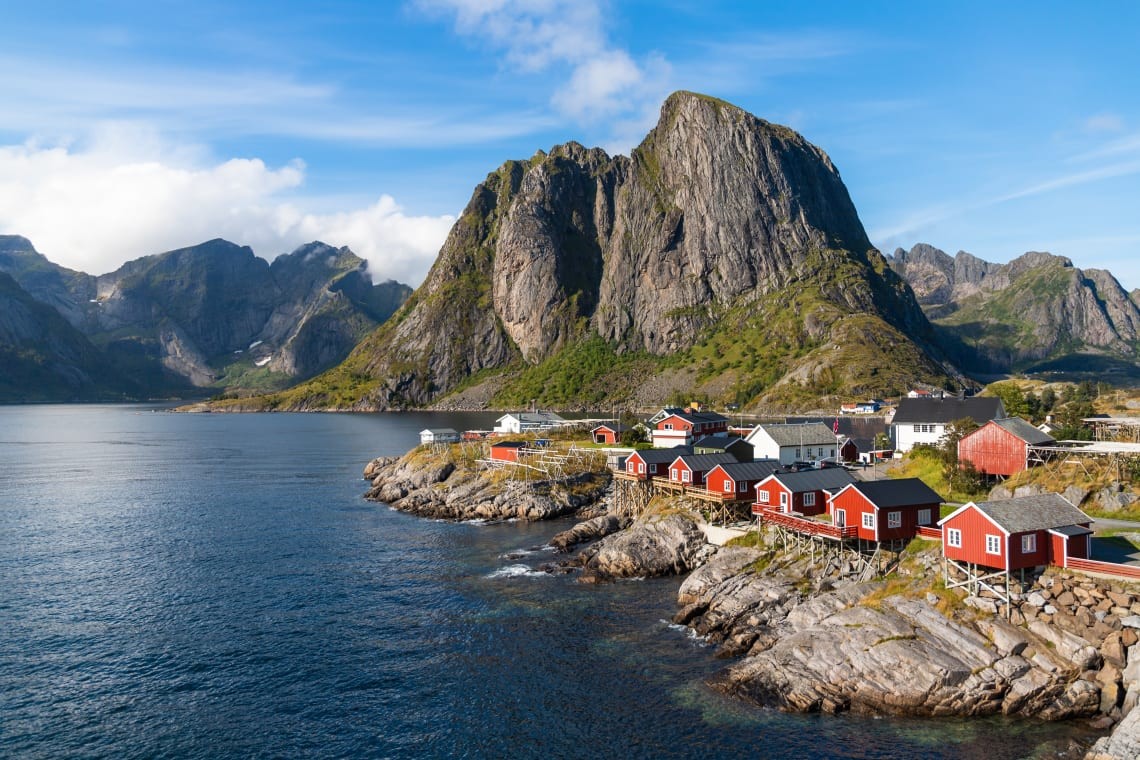Ecotourism offers enriching travel experiences in Vietnam, but how can travelers contribute positively to the local economy and communities? SIXT.VN provides practical solutions for responsible travel that not only benefits the environment but also strengthens local livelihoods and fosters cultural preservation. By choosing local experiences, supporting small businesses, and respecting cultural norms, visitors can ensure their tourism spending has a lasting, positive impact, leaving a legacy of economic vitality, community empowerment, and responsible tourism practices in Vietnam. Planning your sustainable adventures in Vietnam is easier than ever with SIXT.VN’s curated travel services.
1. Understanding Ecotourism and Its Impact
Ecotourism is more than just visiting natural landscapes; it’s about creating a positive impact on the environment and local communities through responsible travel. It involves sustainable practices that minimize environmental impact, support local businesses, and respect cultural heritage. Travelers need to consider their effect when embracing ecotourism.
What is Ecotourism?
Ecotourism is travel to natural areas that conserves the environment and improves the well-being of local people. According to The International Ecotourism Society (TIES), it focuses on responsible travel to natural areas, conserving the environment, and improving the welfare of local people. This means minimizing environmental impact, supporting local economies, and respecting local cultures.
Why is Ecotourism Important?
Ecotourism is crucial for protecting natural resources and supporting communities. It provides economic incentives for conservation, creates jobs for local people, and promotes cultural preservation. As the World Wildlife Fund (WWF) notes, ecotourism can be a powerful tool for conservation by generating revenue for protected areas and supporting sustainable livelihoods.
 Ecotourism focuses on responsible travel practices.
Ecotourism focuses on responsible travel practices.
2. Key Principles of Responsible Travel
To ensure your travels contribute positively, it’s essential to follow key principles that guide responsible ecotourism. These include respecting local culture, supporting local businesses, avoiding souvenirs from protected areas, and using sustainable transportation.
Respect Local Culture
Respecting local customs, beliefs, and traditions is vital for responsible travel. This includes dressing appropriately, asking permission before taking photos, and being mindful of cultural sensitivities. The United Nations Educational, Scientific and Cultural Organization (UNESCO) emphasizes that respecting local culture enhances the travel experience and supports cultural preservation.
Support Local Businesses
Supporting local businesses ensures that your money directly benefits the community. This can involve buying locally made products, eating at local restaurants, and staying in locally owned accommodations. According to a study by the United Nations Environment Programme (UNEP), supporting local businesses helps create jobs and stimulates economic growth in the community.
Avoid Souvenirs from Protected Areas
Taking souvenirs from protected areas can harm wildlife habitats and ecosystems. It’s important to leave natural areas as you found them and avoid purchasing products made from endangered species or natural resources. The Convention on International Trade in Endangered Species (CITES) regulates the international trade of endangered species to protect them from over-exploitation.
Use Sustainable Transportation
Choosing sustainable transportation options, such as cycling, walking, or public transport, reduces your carbon footprint. This helps to minimize environmental impact and promotes a healthier environment for local communities. The European Cyclists’ Federation (ECF) highlights the benefits of cycling for reducing pollution and promoting sustainable urban mobility.
3. How Travelers Can Support Local Economies in Vietnam
Supporting local economies in Vietnam can be achieved through various means, such as choosing local accommodations, dining at local restaurants, buying local products, and participating in community-based tourism.
Choosing Local Accommodations
Opting for locally owned hotels, guesthouses, or homestays ensures that your money stays within the community. These accommodations often offer a more authentic experience and support local families. A survey by Booking.com found that 68% of travelers want their spending to benefit the local community.
Dining at Local Restaurants
Eating at local restaurants and food stalls allows you to savor authentic Vietnamese cuisine while supporting local chefs and food vendors. This not only provides a unique culinary experience but also helps sustain local food traditions. As noted by Vietnam National Administration of Tourism, culinary tourism is an important aspect of promoting Vietnamese culture and supporting local economies.
 Dining at local establishments helps ensure that your money is directly benefiting the community and supporting local businesses.
Dining at local establishments helps ensure that your money is directly benefiting the community and supporting local businesses.
Buying Local Products
Purchasing handicrafts, textiles, and other products directly from local artisans and craftspeople ensures that they receive fair compensation for their work. This also helps preserve traditional crafts and supports cultural heritage. According to the Vietnam Handicraft Exporters Association (Vietcraft), the handicraft industry provides livelihoods for millions of people in rural areas.
Participating in Community-Based Tourism
Engaging in community-based tourism initiatives, such as guided tours led by local people or cultural workshops, provides direct income to the community and allows you to learn about their way of life. The World Tourism Organization (UNWTO) promotes community-based tourism as a means of empowering local communities and fostering sustainable development.
4. Minimizing Environmental Impact While Traveling
Reducing your environmental footprint is a key aspect of responsible ecotourism. This can be achieved through conserving water and energy, reducing waste, respecting wildlife, and choosing eco-friendly tours.
Conserving Water and Energy
Being mindful of your water and energy consumption in accommodations and during activities helps to reduce environmental impact. This can involve taking shorter showers, turning off lights when leaving a room, and choosing accommodations that implement energy-efficient practices. The International Energy Agency (IEA) emphasizes the importance of energy efficiency for reducing greenhouse gas emissions and mitigating climate change.
Reducing Waste
Minimizing waste by avoiding single-use plastics, carrying reusable water bottles and shopping bags, and properly disposing of trash helps to protect ecosystems from pollution. The Ellen MacArthur Foundation advocates for a circular economy model that minimizes waste and promotes resource efficiency.
Respecting Wildlife
Observing wildlife from a distance, avoiding feeding animals, and not disturbing their habitats helps to protect biodiversity. The Wildlife Conservation Society (WCS) stresses the importance of responsible wildlife tourism for ensuring the well-being of animals and their habitats.
Choosing Eco-Friendly Tours
Selecting tour operators that prioritize sustainability, conservation, and community involvement ensures that your tourism activities have a minimal environmental impact. Look for certifications such as the Green Globe or B Corp to identify eco-friendly tour operators. A report by Sustainable Travel International found that travelers are increasingly seeking out eco-friendly tour options.
5. Cultural Sensitivity and Ethical Interactions
Interacting with local communities in a culturally sensitive and ethical manner is essential for responsible travel. This includes learning basic Vietnamese phrases, respecting local customs, avoiding insensitive photography, and engaging in fair trade practices.
Learning Basic Vietnamese Phrases
Learning a few basic Vietnamese phrases, such as “xin chào” (hello) and “cảm ơn” (thank you), shows respect for the local culture and facilitates interactions with local people. According to a study by the University of Queensland, learning local languages enhances cultural understanding and fosters positive relationships between tourists and host communities.
Respecting Local Customs
Being aware of and respecting local customs, such as removing your shoes before entering a home or temple, avoiding public displays of affection, and dressing modestly, demonstrates cultural sensitivity. The Vietnam Museum of Ethnology provides valuable insights into Vietnamese culture and customs.
Avoiding Insensitive Photography
Asking for permission before taking photos of people, especially in rural areas, and avoiding capturing images that portray people in a disrespectful or exploitative manner is crucial. The Ethical Traveler advocates for responsible photography that respects the dignity and privacy of local people.
Engaging in Fair Trade Practices
Purchasing products from fair trade organizations ensures that artisans and producers receive fair wages and work in safe conditions. The Fair Trade Federation promotes ethical trade practices that empower marginalized communities.
 Be careful not to disturb plants or animals. Sticking only to designated trails and paths is also important.
Be careful not to disturb plants or animals. Sticking only to designated trails and paths is also important.
6. Supporting Conservation Efforts in Vietnam
Contributing to conservation efforts in Vietnam can involve volunteering with environmental organizations, donating to conservation projects, participating in citizen science initiatives, and spreading awareness about conservation issues.
Volunteering with Environmental Organizations
Volunteering with local or international environmental organizations allows you to actively participate in conservation projects, such as reforestation, wildlife monitoring, and clean-up campaigns. The Center for Biodiversity Conservation (Green Viet) offers various volunteer opportunities in Vietnam.
Donating to Conservation Projects
Donating to reputable conservation organizations that work to protect Vietnam’s biodiversity and natural resources provides financial support for their efforts. WWF-Vietnam and the Wildlife Conservation Society (WCS) are examples of organizations that implement conservation projects in Vietnam.
Participating in Citizen Science Initiatives
Participating in citizen science projects, such as monitoring bird populations or collecting data on water quality, allows you to contribute to scientific research and conservation efforts. The Vietnam National Museum of Nature offers opportunities for citizen scientists to get involved in research projects.
Spreading Awareness about Conservation Issues
Sharing information about conservation issues through social media, blogging, and personal conversations helps to raise awareness and inspire others to take action. The IUCN (International Union for Conservation of Nature) provides resources and information about global conservation issues.
7. Sustainable Activities and Experiences in Vietnam
Engaging in sustainable activities and experiences, such as hiking and trekking, cycling tours, kayaking and canoeing, and wildlife watching, allows you to appreciate Vietnam’s natural beauty while minimizing your impact.
Hiking and Trekking
Exploring Vietnam’s national parks and nature reserves on foot allows you to immerse yourself in the landscape and observe wildlife up close. Choose trails that are well-maintained and follow Leave No Trace principles. According to Vietnam National Administration of Tourism, hiking and trekking are popular activities for ecotourists visiting Vietnam.
Cycling Tours
Exploring the countryside on a bicycle provides a low-impact way to see the sights and interact with local communities. Many tour operators offer guided cycling tours that focus on sustainable tourism practices. The Adventure Cycling Association promotes cycling as a sustainable and healthy mode of transportation.
Kayaking and Canoeing
Paddling along Vietnam’s rivers, lakes, and coastal areas allows you to appreciate the beauty of the waterways and observe aquatic wildlife. Choose tour operators that prioritize environmental protection and responsible paddling practices. The American Canoe Association (ACA) provides resources and training for safe and responsible paddling.
Wildlife Watching
Visiting national parks and wildlife reserves to observe animals in their natural habitats can be a rewarding experience, as long as it is done responsibly. Follow guidelines for wildlife viewing, such as maintaining a safe distance and avoiding disturbance. TRAFFIC, a wildlife trade monitoring network, promotes responsible wildlife tourism that does not harm animals or their habitats.
8. Choosing Eco-Friendly Accommodations and Transportation
Selecting accommodations that implement sustainable practices and using transportation options that minimize environmental impact are important aspects of responsible travel.
Eco-Friendly Accommodations
Look for accommodations that have implemented eco-friendly practices, such as using renewable energy, conserving water, reducing waste, and supporting local communities. Certifications such as Green Key or EarthCheck can help identify sustainable accommodations. A study by Cornell University found that green hotels can reduce their environmental impact by up to 40%.
Sustainable Transportation Options
Opt for transportation options that minimize environmental impact, such as public transport, cycling, walking, or electric vehicles. When flying is necessary, consider offsetting your carbon emissions by donating to a carbon offset project. The International Civil Aviation Organization (ICAO) promotes sustainable aviation practices and carbon offsetting programs.
 Volunteering with Worldpackers allows you to gain valuable experience and develop new skills while making a positive impact on your community.
Volunteering with Worldpackers allows you to gain valuable experience and develop new skills while making a positive impact on your community.
9. Ethical Consumption and Shopping
Making conscious choices about what you buy and consume can have a positive impact on local communities and the environment.
Buying Fair Trade Products
Purchasing products that are certified fair trade ensures that producers receive fair wages and work in safe conditions. Look for the Fairtrade label when buying coffee, chocolate, tea, and other products. Fairtrade International sets standards for fair trade practices and certifies products that meet those standards.
Supporting Local Artisans
Buying handicrafts, textiles, and other products directly from local artisans supports their livelihoods and helps preserve traditional crafts. Avoid buying products made from endangered species or natural resources. The World Crafts Council promotes the value of crafts and supports artisans around the world.
Reducing Consumption
Being mindful of your consumption habits and avoiding unnecessary purchases helps to reduce waste and environmental impact. Consider buying secondhand items or renting equipment instead of buying new. The Story of Stuff project promotes mindful consumption and challenges the culture of overconsumption.
Avoiding Single-Use Plastics
Refusing single-use plastics, such as plastic bags, water bottles, and straws, helps to reduce pollution and protect marine ecosystems. Carry reusable alternatives and support businesses that are working to reduce their plastic footprint. The Plastic Pollution Coalition advocates for a world free of plastic pollution.
10. Volunteering and Giving Back
Participating in volunteer projects and giving back to the community can be a meaningful way to contribute positively during your travels.
Volunteering Opportunities
Look for volunteer opportunities that align with your interests and skills, such as teaching English, working on conservation projects, or assisting at local organizations. Be sure to choose reputable organizations that are making a positive impact in the community. VolunteerMatch is a platform that connects volunteers with organizations in need.
Giving Back to the Community
Consider donating to local charities, schools, or community projects to support their work and improve the lives of local people. Even small donations can make a big difference. GlobalGiving is a platform that connects donors with grassroots projects around the world.
Supporting Local Initiatives
Identify local initiatives that are working to address social or environmental issues and find ways to support them. This could involve volunteering your time, donating money, or spreading awareness about their work. The Ashoka network supports social entrepreneurs who are working to solve pressing social problems.
Engaging with Local People
Take the time to engage with local people, learn about their culture, and listen to their stories. Building relationships with local people can be a rewarding experience and help you to gain a deeper understanding of the community. The Couchsurfing platform connects travelers with local hosts who are willing to share their homes and culture.
11. Staying Informed and Educated
Staying informed about sustainable travel practices and educating yourself about the issues facing local communities and ecosystems is essential for responsible ecotourism.
Reading Travel Guides and Blogs
Read travel guides and blogs that provide information about sustainable travel practices, cultural sensitivity, and conservation issues. Look for resources that are written by local people or experts in the field. Lonely Planet and The Rough Guide are popular travel guide publishers that offer information about sustainable travel.
Attending Workshops and Seminars
Attend workshops and seminars that focus on sustainable tourism, cultural awareness, and environmental conservation. These events can provide valuable insights and practical tips for responsible travel. The Adventure Travel Trade Association (ATTA) hosts conferences and workshops for professionals in the adventure travel industry.
Following Social Media Accounts
Follow social media accounts that share information about sustainable travel, conservation, and cultural heritage. These accounts can provide daily inspiration and updates on the latest trends and issues. The Sustainable Travel International and the World Wildlife Fund (WWF) are examples of organizations that share information about sustainable travel on social media.
Taking Online Courses
Consider taking online courses that cover topics such as sustainable tourism, environmental science, and cultural studies. These courses can provide a more in-depth understanding of the issues and help you to develop skills for responsible travel. Coursera and edX are platforms that offer online courses from universities and other educational institutions.
12. Planning Your Trip with SIXT.VN
SIXT.VN offers a range of services that make planning a responsible and sustainable trip to Vietnam easier than ever.
Customized Itineraries
SIXT.VN can create customized itineraries that focus on sustainable tourism practices, support local communities, and minimize environmental impact. Their team of experts can help you to plan a trip that aligns with your values and interests.
Eco-Friendly Transportation Options
SIXT.VN offers a range of eco-friendly transportation options, such as electric vehicles, hybrid cars, and bicycles. They can also arrange for transportation using public transport or other sustainable modes of travel.
Sustainable Accommodation Recommendations
SIXT.VN can recommend accommodations that have implemented sustainable practices, such as using renewable energy, conserving water, and supporting local communities. They can also help you to find locally owned hotels, guesthouses, and homestays.
Responsible Tour Operators
SIXT.VN partners with responsible tour operators that prioritize sustainability, conservation, and community involvement. They can help you to find tours that align with your values and interests.
By using SIXT.VN’s services, you can ensure that your trip to Vietnam is not only enjoyable but also makes a positive impact on the local economy, communities, and environment.
13. Overcoming Challenges in Ecotourism
While ecotourism offers numerous benefits, it also faces challenges such as greenwashing, overtourism, and ensuring equitable distribution of benefits to local communities.
Addressing Greenwashing
Greenwashing, the practice of falsely promoting a product or service as environmentally friendly, is a significant challenge in ecotourism. Travelers need to be discerning and look for credible certifications and transparent practices to avoid supporting companies that engage in greenwashing. Organizations like the Green Globe and B Corp provide certifications for sustainable tourism businesses.
Managing Overtourism
Overtourism, the excessive concentration of tourists in a particular destination, can lead to environmental degradation and negative impacts on local communities. Strategies for managing overtourism include promoting off-season travel, dispersing tourists to less-visited areas, and implementing visitor management measures such as permits and quotas. The World Tourism Organization (UNWTO) provides guidelines for managing overtourism.
Ensuring Equitable Distribution of Benefits
Ensuring that the economic benefits of ecotourism are equitably distributed to local communities is crucial for its long-term sustainability. This can be achieved through community-based tourism initiatives, fair trade practices, and ensuring that local people have a voice in decision-making processes. The International Ecotourism Society (TIES) advocates for equitable distribution of benefits in ecotourism.
 Opportunities to volunteer with ecotourism are for nature enthusiasts. It offers the chance to work in national parks, promoting sustainable tourism and conservation efforts.
Opportunities to volunteer with ecotourism are for nature enthusiasts. It offers the chance to work in national parks, promoting sustainable tourism and conservation efforts.
14. Success Stories of Community-Based Ecotourism in Vietnam
Vietnam has several success stories of community-based ecotourism initiatives that demonstrate the positive impact of responsible travel on local communities and the environment.
Sapa Community-Based Tourism
In Sapa, a mountainous region in northern Vietnam, community-based tourism initiatives have empowered local ethnic minority communities and preserved their cultural heritage. Tourists can stay in traditional homestays, participate in cultural activities, and purchase handicrafts directly from local artisans. The Sapa O Chau is one such successful example.
Cuc Phuong National Park
Cuc Phuong National Park, one of Vietnam’s oldest and largest national parks, has implemented ecotourism initiatives that benefit both conservation efforts and local communities. Tourists can visit the park, participate in guided tours, and stay in eco-lodges that provide employment opportunities for local people.
Mekong Delta Homestays
In the Mekong Delta region, homestays offer tourists the opportunity to experience rural Vietnamese life firsthand. Tourists can stay with local families, participate in farming activities, and learn about traditional crafts. These homestays provide income for local families and help preserve traditional ways of life.
Con Dao Islands
The Con Dao Islands, a group of islands off the coast of southern Vietnam, have implemented sustainable tourism practices to protect their unique marine ecosystems. Tourists can participate in diving and snorkeling tours that follow responsible guidelines and support local conservation efforts.
15. Essential Tips for Ecotourism in Vietnam
To maximize your positive impact and ensure a memorable and responsible travel experience in Vietnam, consider these essential tips:
Research and Plan Ahead
Before your trip, research sustainable accommodations, tour operators, and activities. Look for certifications and read reviews to ensure that they align with your values. Planning ahead allows you to make informed choices and support businesses that are committed to sustainability.
Pack Light and Smart
Pack only what you need and choose lightweight, eco-friendly travel gear. This reduces your carbon footprint and makes it easier to travel sustainably. Consider using reusable containers, water bottles, and shopping bags.
Learn Basic Vietnamese Phrases
Learning a few basic Vietnamese phrases shows respect for the local culture and facilitates interactions with local people. This can enhance your travel experience and create opportunities for meaningful connections.
Respect Local Customs and Traditions
Be mindful of local customs and traditions, such as dressing modestly when visiting temples and removing your shoes before entering someone’s home. Following local customs demonstrates respect and sensitivity.
Support Local Businesses
Shop at local markets, eat at local restaurants, and stay in locally owned accommodations. Supporting local businesses ensures that your money stays within the community and helps to create jobs.
Minimize Waste
Reduce your waste by avoiding single-use plastics, carrying reusable items, and properly disposing of trash. Be mindful of your consumption habits and avoid unnecessary purchases.
Conserve Water and Energy
Be mindful of your water and energy consumption in accommodations and during activities. Take shorter showers, turn off lights when leaving a room, and choose accommodations that implement energy-efficient practices.
Respect Wildlife and Their Habitats
Observe wildlife from a distance, avoid feeding animals, and do not disturb their habitats. Follow guidelines for responsible wildlife viewing and support conservation efforts.
Be a Responsible Photographer
Ask for permission before taking photos of people, especially in rural areas. Avoid capturing images that portray people in a disrespectful or exploitative manner.
Give Back to the Community
Consider volunteering your time, donating money, or supporting local initiatives. Even small gestures can make a big difference in the lives of local people.
FAQ: Contributing to Local Economies and Communities While Traveling
Q1: How can travelers ensure their spending benefits local communities in Vietnam?
A1: Travelers can ensure their spending benefits local communities by choosing locally owned accommodations, dining at local restaurants, buying local products, and participating in community-based tourism initiatives.
Q2: What are some ways to minimize environmental impact while traveling in Vietnam?
A2: Travelers can minimize their environmental impact by conserving water and energy, reducing waste, respecting wildlife, and choosing eco-friendly tours and transportation options.
Q3: How can travelers show respect for local culture and traditions in Vietnam?
A3: Travelers can show respect for local culture and traditions by learning basic Vietnamese phrases, respecting local customs, avoiding insensitive photography, and engaging in fair trade practices.
Q4: What are some successful examples of community-based ecotourism in Vietnam?
A4: Successful examples of community-based ecotourism in Vietnam include initiatives in Sapa, Cuc Phuong National Park, the Mekong Delta, and the Con Dao Islands.
Q5: How can travelers find sustainable accommodations and tour operators in Vietnam?
A5: Travelers can find sustainable accommodations and tour operators by looking for certifications such as Green Key or EarthCheck, reading reviews, and researching their sustainability practices.
Q6: What are some ways to give back to the community while traveling in Vietnam?
A6: Travelers can give back to the community by volunteering their time, donating money to local charities or schools, and supporting local initiatives that address social or environmental issues.
Q7: How can travelers avoid contributing to greenwashing in the ecotourism industry?
A7: Travelers can avoid contributing to greenwashing by looking for credible certifications, researching the sustainability practices of companies, and being discerning about marketing claims.
Q8: What are some essential items to pack for a sustainable trip to Vietnam?
A8: Essential items to pack for a sustainable trip to Vietnam include reusable water bottles, shopping bags, and containers, as well as eco-friendly toiletries and travel gear.
Q9: How can SIXT.VN help travelers plan a responsible and sustainable trip to Vietnam?
A9: SIXT.VN offers customized itineraries, eco-friendly transportation options, sustainable accommodation recommendations, and partnerships with responsible tour operators to help travelers plan a sustainable trip to Vietnam.
Q10: What are some common challenges facing ecotourism in Vietnam, and how can they be addressed?
A10: Common challenges facing ecotourism in Vietnam include greenwashing, overtourism, and ensuring equitable distribution of benefits. These challenges can be addressed through greater transparency, visitor management measures, and community-based tourism initiatives.
By following these tips and guidelines, travelers can make a positive contribution to the local economy and communities in Vietnam while enjoying a memorable and enriching travel experience. Contact SIXT.VN today at Address: 260 Cau Giay, Hanoi, Vietnam, Hotline/Whatsapp: +84 986 244 358, Website: SIXT.VN to start planning your sustainable adventure. Let’s make every journey a force for good!



